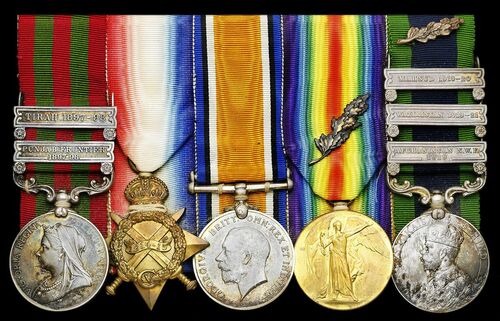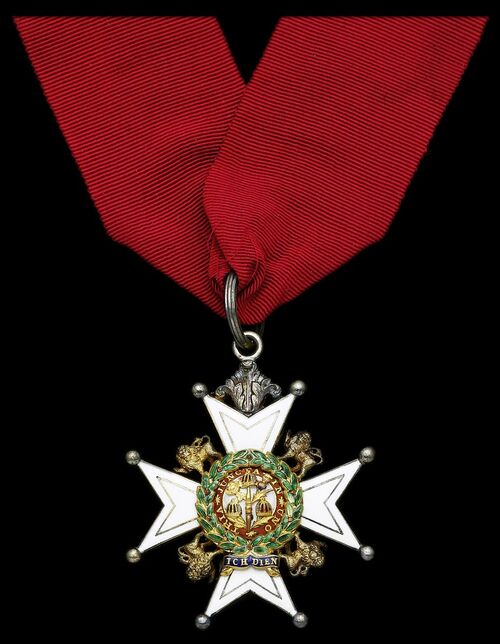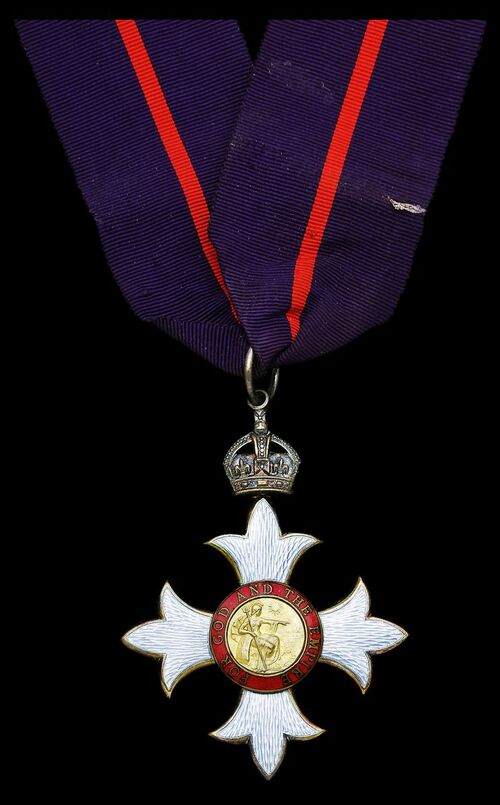Auction: 23002 - Orders, Decorations and Medals
Lot: 93
The North-West Frontier C.B., C.B.E. group of seven awarded to Brigadier-General C. R. Bradshaw, 9th Gurkha Rifles, who planned the Sheikh Said operation in 1914 and was thrice 'mentioned' during his career - once for Waziristan 1920; he would go on to command Military Districts on the North-West Frontier
The Most Honourable Order of the Bath, Military Division, Companion's neck Badge, silver-gilt and enamel, in its fitted Garrard & Co. case of issue; The Most Excellent Order of the British Empire, Military Division (C.B.E.) 1st Type Commander's neck Badge, silver-gilt and enamel, in its fitted Garrard & Co. case of issue; India General Service 1895-1908, 2 clasps, Punjab Frontier 1897-98, Tirah 1897-98 (Lieut. C. R. Bradshaw: 9th Bl. Infy.); 1914-15 Star (Maj. C. R. Bradshaw, 1/9 Gurkha Rfls.); British War and Victory Medals, with M.I.D. oak leaves (Lt. Col. C. R. Bradshaw,); India General Service 1908-35, 3 clasps, Afghanistan N.W.F. 1919, Waziristan 1919-21, Mahsud 1919-20, with M.I.D. oak leaves (Brig. Genl. C. R. Bradshaw, I.A.), mounted as worn, very fine, housed in a fitted A. H. Baldwin case (7)
C.B. London Gazette 1 January 1926.
C.B.E. London Gazette 19 December 1922.
Charles Richard Bradshaw was born in Delhi on 18 January 1873 and baptised at Simla, Bengal on 21 March, the son of Lady Ellen and Surgeon Major-General Sir Alexander Frederick Bradshaw. His father had been serving in India for many years (having in fact been a defender of Lucknow during the Mutiny) and was, in time, to become a personal friend of Lord Roberts of Kandahar. Educated at the Royal Military College Sandhurst, Bradshaw excelled during the course and took the much-coveted Sword of Honour.
He was subsequently commissioned 2nd Lieutenant in the Queen's Own (Royal West Kent Regiment) on 18 July 1893.
Transferring to the Indian Establishment, Bradshaw was promoted Lieutenant on 8 January 1896 while serving with the 9th Bengal Infantry and further advanced Captain on 19 July 1902. Already performing a staff role, here he was promoted to Major as an Indian Army Staff Officer on 19 July 1911. Serving with the 9th Gurkha Rifles by 1914 the Army List for that year places Bradshaw as a Deputy Assistant Adjutant-General in India from 18 November 1912. He transferred to Aden just before the outbreak of war becoming General Staff Officer, Grade 2, with the Aden Brigade.
As a Staff Officer with the Aden Brigade Bradshaw was instrumental in planning the British attack upon Sheikh Said in November 1914. The 29th Indian Infantry Brigade was re-routed from their destination of Egypt to undertake the operation, along with the 23rd Sikh Pioneers. Their goal was Sheikh Said, opposite the British held Island of Perim which lay between Africa and Arabia on the route to the Suez. This vital island was threatened by Turkish troops stationed at Sheikh Said and their positions needed to be stormed as soon as possible. Bradshaw formulated a plan and sailed with the British force under Brigadier-General Cox to undertake it. However, it is possible he didn't take part in the action itself as a request was made to Delhi for a Political Officer to join Bradshaw in a mission to the Arabian tribes at Sheikh Said, the goal of which was to assure them that the attack was not directed at them but at their Ottoman overlords. No reply was forthcoming from Delhi and it is likely that Bradshaw conducted this vital and dangerous mission alone.
Continuing to serve throughout the war Bradshaw undertook exemplary service which resulted in being twice 'mentioned' during the Great War (London Gazette 4 July 1916, India & 27 August 1918, Mesopotamia, refers) while serving as an Acting Lieutenant-Colonel. Confirmed in this rank he was further 'mentioned' during the 1919-20 Waziristan operations while serving as an acting Brigadier-General with 1st Battalion, 9th Gurkha Rifles. Later promoted Colonel-Commandant of the 9th Gurkha Rifles, Bradshaw was appointed Area Commander of the Zhob Area in Baluchistan on 21 November 1923. He retired on 5 June 1928 and lived at 182 Etterick Road, Poole, Dorset, taking up a role in Civil Defence until 30 August 1940 when he died.
For his Royal Military Academy Sandhurst Sword of Honour, please see Lot 156.
Subject to 20% VAT on Buyer’s Premium. For more information please view Terms and Conditions for Buyers.
Sold for
£1,700
Starting price
£1400









